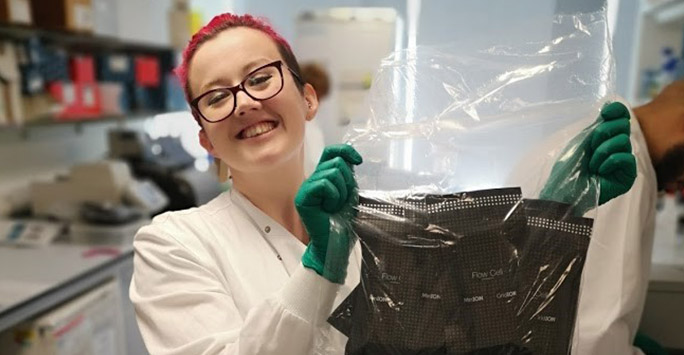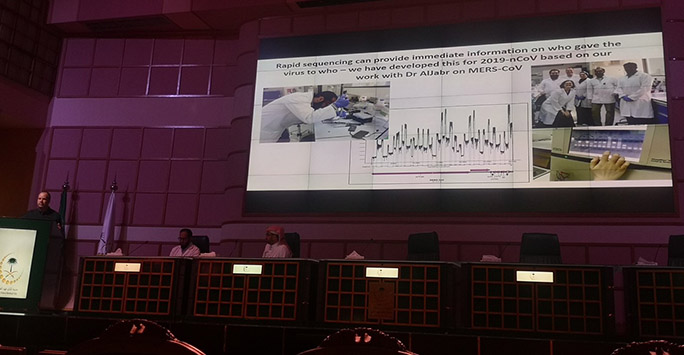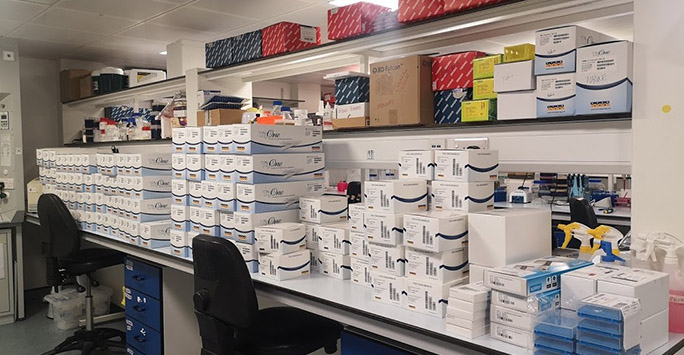How life as a scientist has changed during the COVID-19 pandemic
Posted on: 15 June 2020 by Rebekah Penrice-Randal in News

Rebee is a PhD student in Professor Julian Hiscox' lab which focuses on emerging and respiratory viruses. Read her blog for an insight into how her life has a scientist has changed since the COVID-19 pandemic.
I remember when there was news of a novel virus in China: as virologists, naturally, you start hypothesising what could it be. A coronavirus was probably the best bet, and so there it was, novel coronavirus 2019 (nCoV-19).
In February, myself and members of the Hiscox lab joined our collaborator Dr Waleed Aljabr in Riyadh, Saudi Arabia, to continue our project on Middle-Eastern Respiratory Syndrome (MERS), a disease caused by another coronavirus that emerged in 2012 from camels.
At the time of our trip in February 2020, WHO had not declared the 2019 coronavirus outbreak as a pandemic, although it was identified a Public Health Emergency of International Concern (PHEIC). Travelling to Riyadh during this time felt strange, and I can remember vividly how news of a novel virus was already affecting and impacting people’s behaviours. Masks, gloves, half-filled aircrafts a general sense of unease.

Professor Hiscox sharing our work on MERS in Riyadh in February.
We were in Saudi Arabia for 10 days, and over that time the information coming to light was evolving rapidly. Professor Julian Hiscox, having nearly 30 years’ experience studying and leading coronavirus research, was starting to be interviewed by national radio stations for comment on the situation. Still feeling very surreal, we knew that on return to Liverpool we should get ready, using what we had learnt from our work of MERS.
By the end of February, we were setting up the level three containment lab in order to receive and process samples from the hospital. At 3pm on 27 February, we received three samples from Dr Shona Moore who was central to setting up the University of Liverpool’s response. By 11pm that night, myself and members of the Hiscox lab had taken these samples and conducted experiments to allow us to sequence the viral genome and the metagenome on the MinION by Oxford Nanopore Technologies. This approach was used to determine whether the patients had any co-infections. This research is available to read in MedRxiv.
Since then, we have been spending our time scaling up this approach and training scientists, whilst overcoming logistical challenges. Seeing what was a central workflow for my PhD turn into a scaled up process is amazing. Since lockdown, we have taken stages of this process and split into teams, so we can remain relatively distant and can make adjustments easily should anyone get unwell.

Preparing the lab to accept samples.
Our role in the response is to gain sequence information from the virus so we can study how the virus is evolving. We do this with the hand-held sequencing device called the MinION. This device has been revolutionary in outbreak science and has played a huge role in understanding previous outbreaks such as Ebola virus in West Africa and Lassa virus in Nigeria.
“A day in the life of a scientist” is different for each scientist out there. We are behind the scenes, working closely with clinicians, bioinformaticians and researchers of all varieties, to get the world's research questions answered.
Seeing science and research evolve into a highly collaborative effort has been a really uplifting experience. I say thank you to all scientists, researchers and lab technicians who have given time to this response across the globe. Together, we really can achieve more.
Rebee has recently set up a science communication platform “The Science Social” alongside co-founders Lucia Livoti and Charlotte Blake to overcome the misinformation crisis and to bridge the gap between researchers and communities. Find out more at thesciencesocial.com.
Keywords: research, PhD student, lab work.